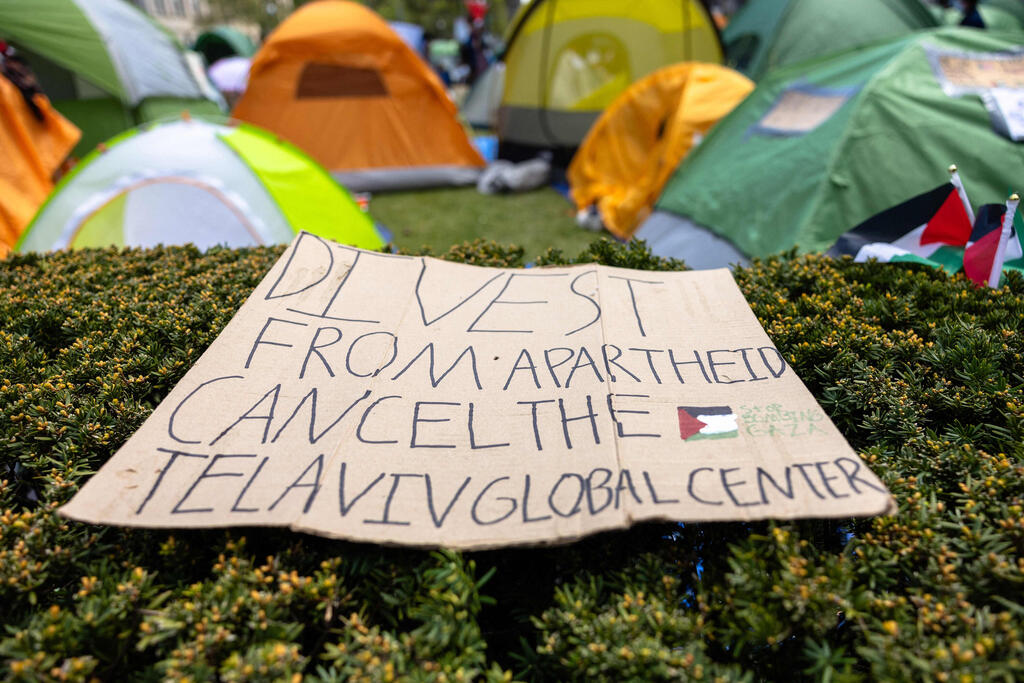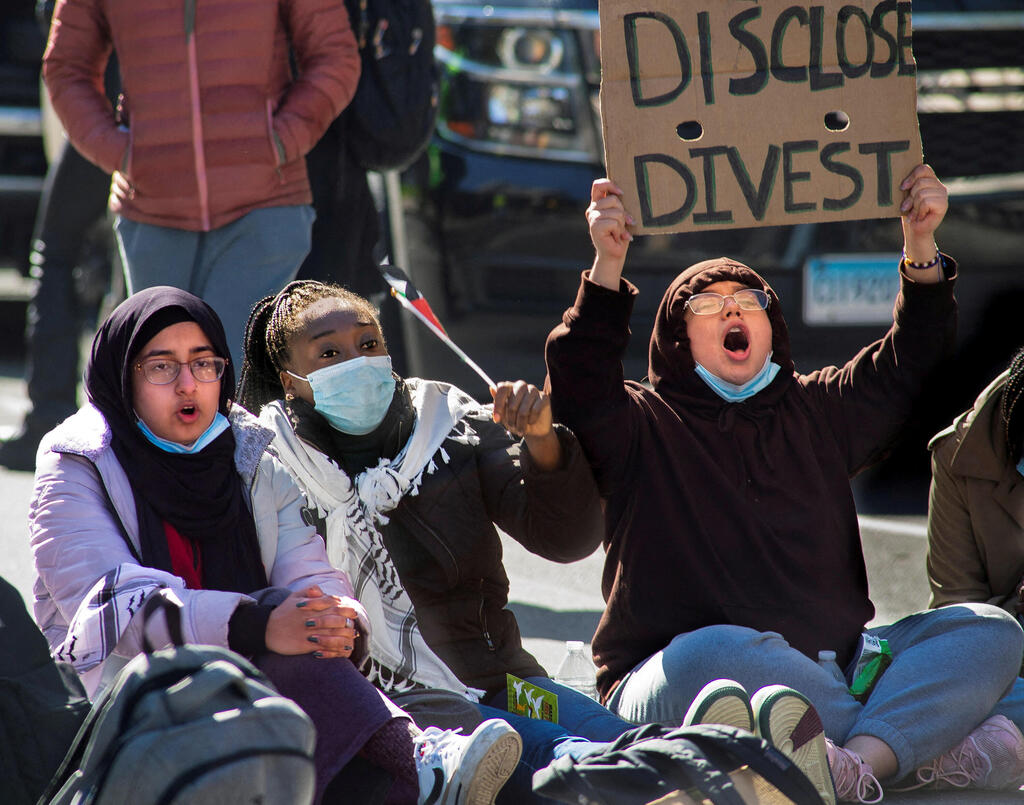Across campuses from Columbia University in New York all the way to the University of Texas at Austin, the echoes of pro-Palestinian protests resonate, sending ripples that might make one feel like they've stumbled into a scene where Wall Street traders have traded in their sharp suits for keffiyehs. The air is charged with cries of "Sell! Sell now!" and chants of "Disclose, divest, we will not stop, we will not rest." The call for divestment from Israel, tantamount to a call for pulling out investments, is loudly repeated.
Pro-Palestinian rally at Columbia
(Video: Michael Lubash)
Diving deeper, these calls aren't just youthful exuberance or a fad like the fleeting fame of a TikTok dance. The demonstrators, far from the naive rebels some perceive them to be, are pushing for American universities to sever financial ties with Israel, citing these investments as backers of the ongoing strife in Gaza. This campaign, echoing the familiar refrain of the BDS movement’s ‘D' for Divest, has found a voice among students who are not only informed but also intensively engaged. They argue, if these investments are so minor that their impact is negligible, why hold them at all?
"We should not be putting even a dollar into what we see as acts of genocide," Clay, a charismatic leader of the Columbia protest, graduate student sporting a blond beard, a flower-adorned hair, and a keffiyeh, explains. "In 2022, we got a resolution passed in the student council to cut all ties with Israeli investments, yet we're stonewalled by those at the top who seem to forget that this institution runs on our dime. They owe their positions to our tuition money—it’s our right to dictate where it should go."
The notion that these students are somehow out of their depth couldn’t be farther from the truth. Unlike the humorous viral clips where some confuse the geopolitical slogan "from the river to the sea" with a Caribbean getaway, the majority are keenly aware of their objectives. They seek inventive, varied approaches to make their stance clear—recall the incident where Israeli couscous in a prestigious school's cafeteria was downgraded to "just couscous salad" under administrative pressure.
Students decide, management ignores
Across various universities, the call for divestment echoes with different intensities and specifics. At institutions like the University of Texas at Austin, Yale, and Cornell, the student demand focuses on halting investments in arms manufacturers that supply the Israeli military. At Columbia and NYU, the call to divest also targets private funds and businesses believed to profit from the conflict in Gaza and the occupation of the West Bank, including high-profile entities like Google due to its contracts with the State of Israel, Caterpillar for its bulldozers used by the IDF, and Airbnb for its operations in the settlements.
2 View gallery


A sign made by the demonstrators
(Photo: Michael M. Santiago / GETTY IMAGES NORTH AMERICA / AFP)
Despite numerous campuses passing resolutions in favor of divestment, these calls often fall on deaf ears within university administrations. These institutions defend their stance by labeling such divestment actions as antisemitic and a threat to academic freedom, freedom of expression, and the values of equality and inclusion. Critics further argue that relinquishing shareholder positions in these companies could strip universities of their influence to effect change from within, suggesting that any new stakeholders may not press as fervently for corporate policy changes concerning issues like arms sales to Israel.
Moreover, a significant barrier to the divestment movement is the opaque nature of university investments. Students confess their uncertainty about the full extent of their universities' financial ties with Israel. With vast sums spread across a myriad of investments, tracing the specific allocations is nearly an impossible task.
Although the U.S. Department of Education mandates that educational institutions report on foreign contributions and contracts, many circumvent full disclosure by funneling funds through independent entities. According to the department, approximately 100 U.S. universities have reported about $375 million in contributions or contracts with Israel over the past two decades, yet the specifics of these financial engagements remain largely unknown.
Despite the unified call to divest across campuses, the way it manifests varies significantly. Pro-Palestinian activists see their call as a clear and achievable method to compel universities to act. It might represent a significant symbolic victory that raises awareness for their cause. They have historical precedents to rely on - for example, similar pressure on universities previously led to the removal of most of their investments in fossil fuel companies, and in the 1980s, students also succeeded in forcing them to divest from companies doing business with South Africa's apartheid regime.
For instance, Columbia made headlines when it sold $39 million in stocks from companies like Coca-Cola and Ford following weeks of protests and the establishment of protest camps on campus, similar to what we see today. Other universities followed suit. In total, more than 150 academic institutions divested from companies that were doing business in South Africa at the time.
Compared to the 1980s, universities today have less direct control over their investments, instead choosing asset managers to oversee portfolios for them. These managers are increasingly investing in private funds and hedge funds. Very little, if any, of the money from major universities today is actively invested in companies that could be linked to Israel.
Even those that acknowledged such investments, like Yale, which was forced to disclose a direct investment in arms companies, stated that it would not divest since the investment did not meet its threshold for "severe social harm." However, even if the influence is limited and the outcomes on the ground are disappointing, one thing is clear: if the goal of the demonstrators is to build a movement, rally the masses, and express moral outrage - the calls for Divest, as recent days have shown, can be quite effective.
Tales of negotiations and wooden walls
After a stormy day full of negotiations and ultimatums, Columbia University declared on Wednesday that the pro-Palestinian student protesters' tent encampment on its New York campus would not be forcibly removed for at least the next 48 hours. This temporary truce was reached after negotiations between the protest leaders and the university, under which a significant number of tents on the lawn will be dismantled, ensuring that non-students vacate the campus, and banning "discriminatory or harassing language" among the demonstrators. "Significant progress has been made, and in light of this productive dialogue, the university will continue discussions with the students for the next 48 hours," stated the university.
Meanwhile, in Austin, Texas, the situation escalated as dozens were arrested following a clash between around 200 pro-Palestinian students and local police forces. These students are also pressing the university to divest from Israel and arms manufacturers that supply it. The police were deployed in force, arriving on campus with horses, batons, and riot control gear.
Over in Manhattan, the NYU campus saw a drastic measure overnight as a tall wooden barrier was erected to prevent further student occupations of a plaza across from the campus buildings.
These intense university scenes in the USA caught the attention of Iran's Supreme Leader Ali Khamenei, who commented on his official X account: "Western governments label the resistance front as terrorism. This occurs while Hezbollah flags are waved on American streets. The world's people support the resistance because they stand against oppression." He highlighted his point with an image from last Monday's Wall Street protest, where Hezbollah and Palestinian flags were displayed side by side.





